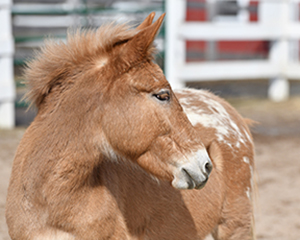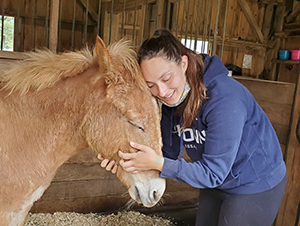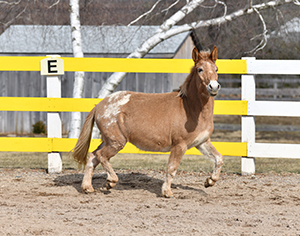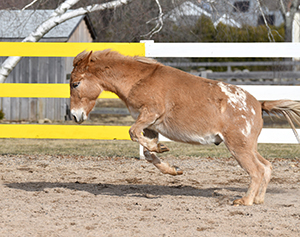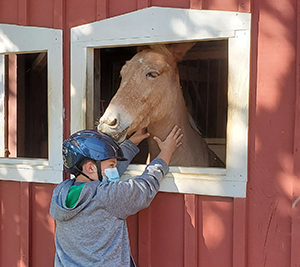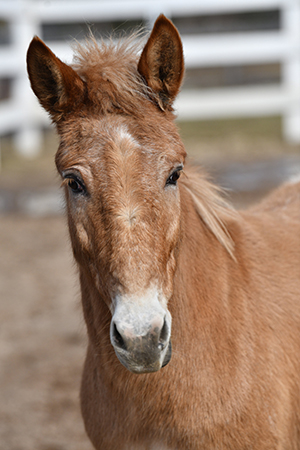Elmer doesn't fit the description of a stereotypical therapy horse. His ears are a bit longer. His stature is a bit different. His whinny doesn't quite sound the same. From time to time, he's even been known to make a noise resembling a whimper. But make no mistake - he is just as capable of facilitating a therapy session as any horse is.
"Elmie" is a mule, which means that he is the offspring of a male donkey and a female horse. He is the first mule inducted into the Horse Stars Hall of Fame. Mules may be either male or female but are not able to reproduce due to their odd number of chromosomes. While they bear a striking resemblance to horses, the musculoskeletal makeup of mules is considerably different - mules tend to be stronger, possess more stamina and are more sure-footed than horses. In addition, mules often exhibit a "freeze" instead of a "flight" response when frightened. These attributes enable the mule to be a valuable addition to equine assisted learning and therapeutic programs.
Elmie was brought to Shepard Meadows Equestrian Center Inc. (SMEC) in 2019. It was immediately evident that the 3-year-old mule had little experience with human contact - he was skittish, shy and reluctant to interact with people at all. The frost-bitten tips of his ears conveyed a winter of neglectful care, and his hair started falling out soon after his arrival. Failure to identify any underlying pathology led staff members to believe that the hair loss was related to stress, and the later re-growth of a healthy coat confirmed their original suspicion. In the two years since Elmie arrived at SMEC, he has blossomed.
"He has become a visitor, volunteer and staff favorite," said Shelly Whitlock-Pope, who works with Elmie at SMEC. "He keeps an eye on the entire herd, communicating news such as dinner time and when horses are being brought to and from the barn. He is a good babysitter for those who might otherwise be alone in our barn for a short time between programming."
It's true that the young mule seems to fancy himself a welcoming host, with his prime real estate boasting two windows and a view overlooking the courtyard from which he readily welcomes visitors. But his contribution to SMEC doesn't stop there. He also participates in unmounted activities and equine assisted therapy sessions, and he especially loves working with children.
"He's really good at connecting with kids with attention-deficit/hyperactivity disorder (ADHD) and autism (ASD)," Whitlock-Pope explained. "We have begun partnering him with our equine assisted psychotherapy program as well as with youth development and equine assisted learning. He is especially responsive to youth with ADHD and ASD. His movements and communication are very clear, and youth often relate to him."
Whitlock-Pope also shared a story from early on in Elmer's career in therapy work, in which two girls from an alternative school came to visit SMEC.
"One of the girls reached out [toward Elmie] and he took a step back," Whitlock-Pope remembered. "She immediately said, 'Oh, he doesn't like me.' Then, a second later he took two steps forward. [The girl] broke down crying because, you know, she's thinking, 'He does like me.' How many times in a day does she feel like somebody doesn't like her . . . and here's this mule that says, 'That's not true.'"
When he's not busy engaging in his own work, Elmie can be found hanging out near other ongoing sessions and offering his support to horses and humans alike. No, he may not be a traditional therapy "horse," but he's busy breaking the mold and proving that a mule can do everything a horse can do, even if he looks a little bit different doing it.
"I believe he's totally magical," Whitlock-Pope confessed. "There's something about him we can all learn something from."
